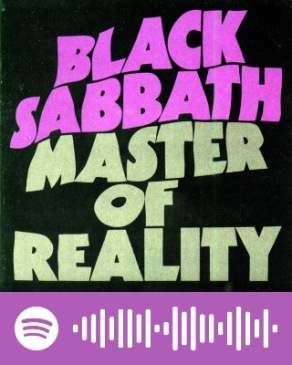Listen to this!
- Staff Writer
- Mar 8, 2021
- 3 min read

Rory JohnsonStaff Writer Black Sabbath’s “Master of Reality” is turning 50 years old this July and has remained a classic throughout its years. I consider “Master of Reality” my favorite Black Sabbath album because of songs like “After Forever” and “Lord of This World.” Another reason I enjoy the album is the mystical cover art, which plays into the namesake. The album starts off with the song “Sweet Leaf,” which features a man coughing starting in the left and ending in the right ear. The effect plays right into the song and the menacing guitars. The lyrics detail how meeting someone or something introduced Tony Iommi, guitarist and lyricist, to his mind. The song continues with lyrics about how this “sweet leaf” showed them around and gave Iommi purpose. For most of the song, there is a chugging guitar part repeating until a breakdown halfway in. Afterward, the lyrics and guitar come back in full swing. The next song on the album, “After Forever,” was written by bassist Geezer Butler. The lyrics are a direct response to critics calling Black Sabbath “Satanists.” One of my favorite parts of the song is the beginning bass playing more of a melodic part. The bass plays well with the guitar and sounds like it wants to excite the listeners. The lyrics depict how it is alright to believe in Christianity and God and how you shouldn’t fall in line with others who try to say it is nonsense. “After Forever” also talks about what happens after living and how accepting God will save you from all of your hate. Ironically, “After Forever,” is not a song the average listener would think Black Sabbath would make, but it shows they are not afraid to go against their typical message. The next song, “Embryo” functions as a 28-second interlude that is reminiscent of medieval themes. While it is not the most memorable song, I think it fits the persona of the album. “Children of the Grave” is one of the more menacing songs on the album with the guitar being dropped to a lower pitch to help achieve this effect. The lyrics talk about children trying to revolutionize to bring about a better tomorrow. Stating “Children of tomorrow live in the tears of today,” and “Can they win the fight for peace or will they disappear?” “Children of the Grave” musically features angry toms playing triplet fills to push the song forward with the galloping bass line. The guitar playing with the bass at times has an angry tone adding to the song with its own solo. Up next is the second interlude, “Orchid,” which again gives off this enchanting, suspenseful medieval tone with acoustic guitar and electric bass. “Lord of This World” has my favorite Ozzy Osbourne vocals on the album and he sells it right away with the opening verse. His vocals are strong, and the listener can tell Ozzy cares about the lyrics. The lyrics are cynical talking about someone who has an ill soul, but the ill soul believes it is innocent – saying that the person chooses evil ways instead of love and that they are looking for a cure that doesn’t exist. “Solitude” is one of the more atmospheric songs Black Sabbath plays since it is a ballad. Musically, it features piano and flute both being played by Tony Iommi with another medieval theme. The lyrics pertain to the loneliness one feels when a lover has been lost. Commenting on how memories remind them of a past lover and how lonely the world can be. The lyrics also mention without them the singer’s life is uncertain and shrouded in darkness. The song overall is morbid, but unique for it is Black Sabbath’s first real love song. The last song “Into the Void” is one of the angriest on the album. The lyrics and guitar paint an image of rage for how humans have polluted the Earth – saying how some will escape into the void and leave the Earth behind with all its sin and hate. The guitar makes listeners feel mad that humans let themselves ruin Earth. While the title “Master of Reality,” is somewhat unrelated to the album, I think the songs help justify the name. Almost every song deals with a master or someone important that has impacted the character of the song in some way. The person impacting the character has control of “reality” and their perception of life. Black Sabbath provided a lyrically deep album on top of the stellar musicianship. Almost 50 years later, “Master of Reality,” remains relevant today.

Comments